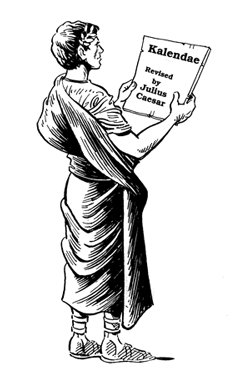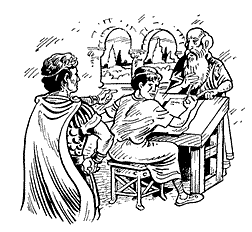Calendar, Julius
(July, formerly Quintilis)
Iulius (Julius), Named in Honor of Julius Caesar
Julius (July) was originally the fifth month of the earlier Roman year known as Quintilis. This name is derived from the Latin word for five, quinque.
By the way, do you think that the operation called a caesarean (cesarean) section has anything to do with Julius Caesar? Read more about this very controversial subject at the "caesarean section" page.
- When the Roman calendar was revised by adding January and February to the beginning of the year, Quintilis became the seventh month; however, this was still the name of the month even though it was no longer in numerical order.
- Quintilis was renamed Iulius (Julius) and later July, in 44 B.C. in honor of Gaius Julius Caesar (c. 102 B.C.-44 B.C.).
- Theodosius Macrobius, a Roman writer of the early fifth century A.D., wrote about the circumstances of the name change:
". . . the month was called Julius in honor of the dictator Julius Caesar in accordance with a law proposed by the consul Marcus Antonius, the son of Marcus. It was so called because Julius had been born in this month on the fourth day before the Ides of Quintilis" [what would now be the 15th day of July].
- The number of days allocated to Quintilis was 30, but after its name change to Iulius, the total days became 31.
- The changing of Quintilis to Julius may be considered a proper tribute to Julius Caesar because after several long years of civil strife, he was credited with making many administrative reforms at Rome, including the revision of the inaccurate ancient calendar.
- The resulting calendar, adopted in 45 B.C. stayed in effect until Pope Gregory XIII was given credit for revising the Julian calendar in A.D.1582.
- Holding among other titles that of high priest, Caesar determined to reform the calendar so that it would be as nearly self-correcting as possible.
- In 46 B.C., on the advice of the astronomer Sosigenes, a Greek from Alexandria, Caesar reshaped the roman calendar, basing it on the Egyptian solar year; he kept the old Roman month names but assigned the months an unequal number of days.
- While setting aside the lunar basis of the calendar, Caesar apparently insisted that Sosigenes annex to the new calendar a separate system for calculating the moon’s cycles to guide the dating of festivals that were dependent on the moon’s changes.
- It seems that Sosigenes chose the 19-year Metonic lunar cycle from Greece, and he gave his lunar calculations of March 1 as the starting month in the solar year.
- Caesar’s calendar, known as the Iulian (Julian) calendar, went into effect in 45 B.C. It ordained that three successive “common years” of 365 days should be followed by a fourth year with an extra day that was intercalated in the month of February to make a total of 366 days.
- With this method, the real solar year, estimated by Sosigenes at 365.25 days, was systematically expressed in calendar years of whole days.
- By intercalating 90 days in the year 46-45 B.C., Caesar also made spring begin once more in March.
- The Julian reform also reaffirmed January 1 as the start of the Roman calendar year.
- July 7 was the festival of Juno Caprotina, in honor of Juno in her role as protector of female slaves.
- On July 8, the important festival of Castor and Pollux, the twins called the Dioscuri, took place.
- Castor and Pollux were identified with the zodiacal constellation Gemini, “twins”.
- The cult of the twins, renowned for athletic and military prowess, was a popular one in Rome, and a temple in their honor was constructed in the Forum.
- Until the end of the 18th century, the name of the month was pronounced with the accent on the first syllable; therefore, recalling its derivation from Julius.
- Examples of the pronunciation of July were presented by the English poets Sir John Suckling and William Wordsworth as they rhymed it with newly (Suckling) and truly (Wordsworth).


Thirty days hath September,
April, June, and November;
All the rest have thirty-one
Excepting February alone: Which hath but twenty-eight, in fine,
Till Leap Year gives it twenty-nine.
April, June, and November;
All the rest have thirty-one
Excepting February alone: Which hath but twenty-eight, in fine,
Till Leap Year gives it twenty-nine.
